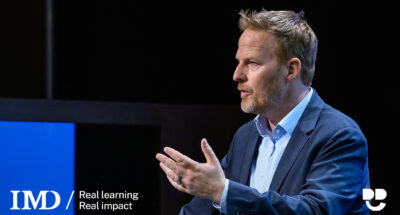
How do deans lead when the world turns upside down?
Global deans Catherine Duggan and Darren Dahl on leading through turbulence — and why optimism, not certainty, is the real power in today’s business education. ...

by Susan Goldsworthy Published 3 June 2024 in Leadership • 6 min read
When you hear “apocalypse” what comes to mind? For many, it is synonymous with world-ending destruction. However, the term actually comes from the Greek word apokálypsis, meaning revelation or uncovering.
Faced with environmental collapse, societal upheaval, rising geopolitical tensions, and rapid technological disruption, it has become clear that the current economic system is not fit for purpose. I believe it is time for a radical rethink of how business will meet the environmental, social, and economic challenges of the 21st century; a so-called “apocalyptic” approach to leadership where we reveal what is happening to the world and act to co-create the conditions to support good health and well-being for all.
This task has never been more urgent, and a rise in extreme weather events means we can no longer live in denial about what is happening around us. Scientists warned in a 2023 report that the planet is “well outside that safe operating space for humanity” due to the impact of our pollution and destruction of the natural world. Rising populism and increased polarization are putting our political systems under strain, while a growing number of employees are taking time off work due to declining mental health. In a survey of more than 6,000 executives that I have been conducting since April 2020, between 35% and 65% of respondents say they are now operating from a place of survival or burnout. Even those who are operating in what we call the “performance zone” say they flip more easily into frustration and anger, reflecting an increase in anxiety following the pandemic.
The challenge is that whenever we feel stressed, we are more likely to operate from a place of fear, meaning we fall back on a mindset that is fixed, judgmental, and focused on polarities. Yet if we are to lead change and break the cycle of destruction and burnout, we must first make a conscious choice to embrace a growth mindshift where we are constantly learning, evolving, and acting with curiosity. As Albert Einstein said: “The most important decision we make is whether we believe we live in a friendly or hostile universe,” because it is the way we choose to view it which impacts the way we show up in the world.

Research has shown that human beings have two fundamental psychological needs: acceptance and achievement. When both are met, we feel grounded and can perform at a high level; we feel comfortable challenging and being challenged by others without acting defensively. In other words, it turns off the flashlight of fear. This is the mindshift we need to acknowledge that our actions are unsustainable and that we need to join forces together for collective change.
So how do we as leaders create this inclusive environment at an organizational level?
The first shift is to think of yourself as a “coach” rather than a “manager.” As renowned management thinker Peter F Drucker said, “The leader of the past knew how to tell, but the leader of the future will know how to ask.” Given the challenges we face, no single person can have all the answers. The higher you climb up the leadership ladder, the more important it is that you learn to be curious, ask questions, and encourage others to share their thoughts and feelings.
Second, set a framework where people feel empowered to take risks. Importantly, this framework must not be anchored to old leadership myths, such as the notion that emotions have no place in business, or that people can’t be trusted to work remotely. In a rapidly changing world, what got you here won’t necessarily keep you here. If we want innovation, we need to create inclusivity where people feel psychologically safe to contribute their full potential without fear of retribution.

Awareness of how we lead is critical. Often, we operate under conditioned assumptions without ever pausing to question them. Viewing ourselves objectively and becoming aware that we may be acting defensively based on past behaviors or conditioning is an important step toward a growth mindshift. This requires taking time for self-reflection, practicing mindfulness or breathwork, and importantly, soliciting feedback from others as to how our behavior impacts those around us to gain awareness of how we lead. Make sure, however, that your self-questioning comes from a place of curiosity and not judgment.
The next step is taking responsibility for where we are and how we act, recognizing that we have power to choose rather than falling into a state of victimhood. Lastly, it involves embracing a more responsible and inclusive form of leadership. Underlying these three steps is the concept of agency; we can all intervene in our routine, habitual responses and choose an alternative approach. When we increase awareness, take responsibility, and act accordingly, we awaken our potential.

A good place to start is to think about the language you use. So much of the vocabulary of business is based on metaphors of machinery and warfare. Think “engines of growth,” “key performance indicators,” or even “bullet points.” Rather than using the term “deadline,” why don’t we shift to a project “due date.” This has much more natural connotations with the idea of creating something positive.
It is also important to cultivate connections to strip away the veneer of hierarchy and unite towards collective goals. Practice active listening by showing interest in others, tuning into their non verbal signals, and giving them your undivided attention. Moreover, express gratitude by reminding yourself how blessed and fortunate you are, and scheduling a short daily reflection by asking yourself simple questions, such as, “When did I have a fixed mindset today, and why?” Or “When did I have a growth mindshift, and why?”
Cultivating a growth mindshift won’t happen overnight. It takes daily practice. Yet it is essential work if we are to focus on how individuals, organizations, and society can not only survive but thrive by collectively creating a more sustainable future for everyone. After all, when we free ourselves from the constraints of fear, the possibilities are limitless. As Howard Schultz, the former CEO of Starbucks, said, “Dream more than others think practical. Expect more than others think possible. Care more than others think wise.”

Affiliate Professor of Leadership, Communications and Organizational Change at IMD
Susan Goldsworthy OLY is an Affiliate Professor of Leadership, Communications and Organizational Change at IMD. Co-author of three award-winning books, she is also an Olympic swimmer. She is a highly qualified executive coach and is trained in numerous psychometric assessments. She is Director of the IMD Executive Coaching Certificate and Program Director of the Leading Sustainable Change program.

19 May 2025 • by David Bach, Felix Zeltner in Leadership
Global deans Catherine Duggan and Darren Dahl on leading through turbulence — and why optimism, not certainty, is the real power in today’s business education. ...

19 May 2025 • by Peter Voser in Leadership
Board members have a central role to play in helping organizations steer a safe path in a polarized and skeptical world....
 Audio available
Audio available
16 May 2025 • by Merete Wedell-Wedellsborg in Leadership
Our new ‘normal’ turned out to be grimmer than many anticipated. Ask yourself these seven questions to find out if you and your team are fit to face the rocky road ahead....

13 May 2025 • by Mark J. Greeven, Sophie Liu, Wei Wei in Leadership
How CR Beer, the brewer of Snow beer and the exclusive Chinese partner of Heineken, redefined its legacy by shifting from mass‑market volume to premium innovation and Baijiu diversification under the bold...
Explore first person business intelligence from top minds curated for a global executive audience